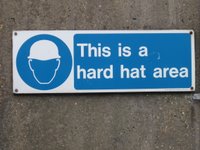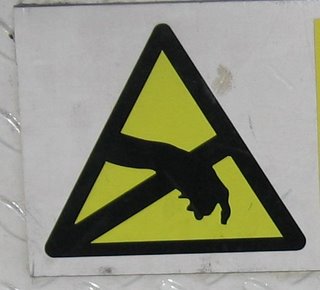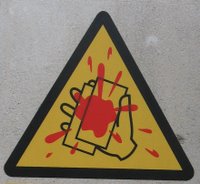Two years ago, me and Michael went to find stuff in the rubbish outside the big supermarket not far Halleluja Villas. Michael was riding his swanky self-built mountain bike; when we got to the Sainsubry skip he took some pictures of me next to the rubbish with his digital camera.
As he was doing this I noticed somebody coming in our direction. He was black, and
had a bag. It was around midnight.
I was sure he's the security guy, as security guards in London are almost always black.
"So what do we have here?"
(me) nothing.
(michael) taking pictures for old times sake.
Two many cameras around as it is if you ask me. Well you'll excuse me but
I'm going to look for food here.
Oh (sigh of relief from both of us) that's the reason we're here too.
Ah (he doesn't believe us).
we start going through the plastic bags, the skip is absolutely filled with
stuff. i find some bananas and offer him.
You touch it, you take it, he says, that's how it goes. I have a feeling
you're not entirely honest with me. Who are you really? What are you doing
here?
We're just looking for food, i say.
he's still suspicious.
I'm michael, says michael.
Well I'm Mr Christmas Lavan. No jokes, please, I've heard them all. Born in
Paris, parents from Jamaica, grew up and live in London.
The loot was pretty miserable - just some bread and a few fruits. Me and michael decided to head back home.
See you around, michael says to Christmas Lavan.
Probably not, says Christmas.
On the way back I tell Michael that I find Mr. Lavan's name is a bit ironic.
Why?
Because Lavan means white in Hebrew.

Thursday, December 28, 2006
A White Christmas
Saturday, December 23, 2006
Wednesday, December 20, 2006
Saturday, December 16, 2006
The Market Diaries: Organic Waste

On my weekly visits to the Market, I try to find as much of possible organic produce. There are two suppliers specialising in organic fruits and vegetables, and I always check their bins in the beginning and the end of my tour. I may be eating from the rubbish, but I don’t like eating trash. As a down-and-out foodie I am highly conscious of my diet, and I prefer not to eat pesticides.
But why? Take bananas for example. Since hearing first-hand stories about the amount of chemicals used in banana plantations, I stopped eating non-organic bananas. But lately I looked into it more seriously. It appears that non-organic bananas are among the safest to eat, much more than peaches for example. Very simply, the pesticides remain on the fruits’ skin. As one obnoxious anti-organic website put it: ‘You want to get the pesticides off the banana? Peel it’.
So why eat organic bananas? Because non-organic plantations use enormous amounts of pesticides, which seriously harm the workers; because huge banana plantations, operated by giant agro-businesses like Del Monte, are among the worse in third-world exploitation; because these massive plantations are dangerously unsustainable. All these factors should inform consumers’ decisions. Even when a fair-trade and organic banana is not much ‘healthier’ than a ‘normal’ one, it is healthier for the planet and for the fellow-humans who grow it. Put it another way, when you buy non-organic, you actively support the poisoning of plantation workers and the degradation of their habitat.
But here’s the point: I don’t buy bananas. I find them in the rubbish. And still, when I’m strolling between the skips, I imagine myself as a consumer. Even after four years of skipping, the radical implications of this strange find-and-lose economy are still too confusing for me to take in. It doesn’t make sense to be able to find all this food for free. – But what really doesn’t make sense is the system which produces this waste.
As I’ve said before, the global free-market economy is based on waste no less than it is based on short-term profit. On every visit to the market, I am made painfully aware that the waste I encounter – some of it I salvage and eat, part of my
Commercial Organic agriculture is part of this economy. People buy Organic (or ‘biological’ as they call it in
Thursday, December 14, 2006
It took N a couple of seconds to realize what was going on and to jump after him but it was too late. 'He was so cool about it, didn't panic, just said hi and walked out.'
The cops were not surprised. 'Typical Hackney. He didn't give you his card by any chance?'
Asked about crime advice they said: 'Well it's not a nice place to live around here unfortunately is it? Don't leave the window open again. And don't join the local gangs. Yes, short term you get lots of fun, but mid-term your life expectancy drops. Bad move, gangs'.
The Forensic expert came a few hours later. A chatty Italian girl in normal clothes and a big suitcase, she looked like out of a TV detective series. She said burglars, if caught, go to jail only after three convictions. 'But that doesn't help much either. For people like you, maybe one night in prison would be enough to deter you for your whole life. But for them three months in prison is nothing. They just learn new techniques and go out more experienced. Prison doesn't solve anything. Crimes like this are about poverty and social exclusion.'
But she said things are not so bad as the newspapers say. 'Chances to get burgled in Hackney are about the same as in west London, once in seven years. And violent crime is still very low compared to the U.S. If you're not involved with drugs and crime, the chances to be randomly stabbed or shot at are close to zero.'
I'm always amazed how, unlike in Israel, there are no iron bars here on ground floor windows. It's really not that difficult to get into houses in London. This has its advantages, when you're squatting.
Tuesday, December 12, 2006
This morning by the kitchen table: green tea, oats porridge with skipped organic bananas (
And now in my room, my temporary room, as always. At least my books are here, to my left, a long shelf of them within reach: five volumes of a vexed Walter Benjamin; a Russian Made Simple book I’ve yet to try; Foucaults in different shapes and colours; the Sakakini Diaries; Kafka’s Letters to Felice, and Sebald, and Ida Fink.
In front of me, the melancholy of the yard: an angel hooked to the wall, leaning forward, one arm fluffy, the other amputated. The candle holder weighs her down. She is a gesture of consolation. She is light as a feather, yet anchored to the brick wall. She will never leave this place. And what about me?
It’s passed midday, and I have not managed to do much yet. The days are growing short and cold. Soon it will be the longest night of the year. I think this is my last winter in
Friday, December 08, 2006
Film Glamour
Drip.
Drop.
Now the florescent light in the stairway outside the front door has gone erratic.
On.
Off.
Onnnnn
Off
Add ice-cold water from the taps, and London darkness at three o'clock -
my life is becoming a cliched European art film.
Tuesday, December 05, 2006
Drawing Studio
don't take anything!
Text always attracts my attention although it makes it difficult to go into a meditative phase. I thought of possible variations on this theme, such as: don't take everything / don't take a thing / don't take nothing when suddenly the world became slow and dark and very hot. My head swang out of position. Your head should be a little to the right came the remote voice of one of the carvers. English is so difficult for me at these situations I need a rest I managed to say while I found myself sitting on the floor, my body leant forward, my knees supporting each other. The floor was sooted with drawing charcoal and pencil sharpening and the thought that it's too dirty to sit on naked passed vaguely through my mind but I couldn't do much about it. I asked for some water.
Don't worry, if you faint, we'll just put you back there and continue to work
Carvers are not known for their sensitivity.
Slowly I came back to my senses, and I resumed to pose. It's never happened to me before. I think the heaters were too close to me; I was sweating and not drinking enough. Or maybe it's doing physical work after four months of academic degeneration.
Monday, December 04, 2006
Saturday at the market
The first time you went to the market was on Saturday. Stuart said it's hassle free day, but in fact you were caught by a guard, wearing florscent jacket and talking on his radio. He demanded you throw everything you found (these potatoes as well); but you had more in the other bag. When asked why, he murmured something about rats in the skips, and the danger of rabis. Since then it's been four years and you have not seen a rat in the market. Coming back home to the Funeral Parlor, you cooked lunch, and ate (with some suspicion) your best prize from that day: a tray of half frozen lobster-filled ravioli.
Wednesday, November 29, 2006
Tuesday, November 21, 2006
A house of ghosts
In the flat I am surrounded by people's things. Like all long-term squats the flat has become a sanctuary for people to store their things, temporarily - but temporality is squatting, and squatting is temporality. And so I find around me the belongings of former inhabitants, ex-lovers, friends, and housemates, people I knew and people I never met; three bicycles (none of them mine); dozens of boxes and suitcases; clothes and books, framed kitsch posters salvaged from the rubbish; a large oak-wood coffee table, personally imported from Latin America; market shopping trolleys; and more, much more. I have reasons to believe that most readers of this blog left something or other in the flat. And yes, my things are there too, three shelves of books, they have their place in this constellation of clutter.
What is it about this city
What is it about London that can bring me to my knees so easily? My precarious housing arrangements no doubt contribute to these moments of inexplicable despair. Yet I know that such experiences are common for Londoners, even for people in 'normal' housing situations, with hot water and heating. Depression comes so easily here: it is this city's second nature, it runs in its veins.
Partly it is about the city's magnitude. Stretching over such a large area, and encompassing eight million people, one feels a small insect in this colony of human ants. The size of the metropolis is de-humanising. But in London it seems that the solitude of a face in the crowd is more cruel than anywhere else.
Many times it feels like fighting a monster. Any simple task which involves the formal authorities or large corporate companies turns into mission impossible, devouring days and weeks of precious time, chasing forms and phone numbers. It is perhaps no surprise that the Corporation of London's chose the dragon as its symbol. Only Saint George can slay the beast, but he's busy doing riverside-highrise-development-speculation.
Often I feel it's London's architecture that is making it so hard and unwelcoming. There is something so anti-human about the architecture here, as if the buildings were designed to humble, to limit, to contain. I feel it in the street and at home, outside and inside, it always seems more than simple lack of attention to human needs (sunlight, space, comfort), but rather a conscious attempt to circumscribe one's movements, to teach you that you have a limited space.
All these anxieties somehow break free when I try to leave the house. The moments between outside and inside, when I give up the limited protection of the home, and yet cannot bring myself to step outside, often become long battles. London is watching me through the window; it wonders if I'll ever make it. It feigns disinterest and turns cold and dark. I am left inside, on my own, to collapse on the floor, and listen to the din of a full gas bottle, as my fingers tap on it rhythms of despair.
* * *
The next morning was different. Coffee-frenzied and optimistic with no reason, a walk from Liverpool St. Station to Bloomsbury, in two stages. Walk! I never walk in London. The streets moved around me, first steel and glass then brick and mortar. The fake old-new red lions on Theobald road smiled to me and threw some sunlight in my direction. Memories of skipping victories touched every corner. I felt that this is my city. I know its ways; as long as I don't tease the beast, or try to fight with it, it will take good care of me.
Thursday, October 05, 2006
Three Months of Cold Showers
Have you done your physical exercise this morning?
Have you taken a [cold] shower?
Have you read anything today? Have you written anything?
(Khalil Sakakini trying to propagate his lifestyle, Sakakini Diaries, 1914)
I have taken up the Sakakini regime; I overdid the exercise (yoga), and had to stop it because of pain in a joint. But for the last three months I've kept taking a daily cold shower, first thing in the morning. True, I had little choice (I don't have hot water in the flat). But I soon embraced this way of waking up. In a time of confusion it gave me an anchoring point, a basic rhythm; it got me out of bed on days I saw no point in starting. This was a hard summer, and often, after nights of anguish and anger, the cold water would wash away the pain and bitterness, and help me smile, as I dried myself, shivering.
I kept it up even when I went away this summer, when I stayed at places that had hot water, I zealously opened the cold tap, put my head under the shower head, and waiting for the gush that would make my breathing stop for a couple of seconds. Then I would shake my limbs, then the world would sharpen, and the day begin. I took a cold shower this morning, in Jerusalem.
Yes I am in Jerusalem, for a few weeks, facing life and doing research. I will be blogging on my Jerusalem blog.
Monday, October 02, 2006
Five Enrolment Poems
RRRAHIST, Research History
Of ART
Mode of Study: Full Time
Year of Programme: 4/FT
Fee Status: Overseas
Accomodation
The type of accommodation where you intend to live during your study can best be described as:
1. Property rented from the university
2. Home of parent or guardian
3. Property owned or rented by yourself
4. None of the above
Ethnicity
We
currently have you recorded
as 19
(White other background).
If this is incorrect, please tick the correct code.
Disability
We
would like to offer you a further opportunity to declare
a disability or medical condition.
We currently have you recorded as
0 (NO DISABILITY)
Belongings
Your nationality:
1677 Israel
Your country of permanent residence:
1677 Israel
Sunday, October 01, 2006
They went off to kill the ripper and I had a very good night sleep.
iäm sörry for funny spelling but this keyboard is swedish
+ + +
Cycling to college through Sunday London, on the first day of Automn, it's official now. And it's still so warm - what a crazy hot September it was - but you can feel it in the air, the sweet excitement of falling leaves, that will take us all the way to the new year, to the new jerusalem. My social life has been shifting to north east London, to Hackney, yes I find myself eating Turkish on Kingsland road, watching dusk from the top of the Rio cinema, crossing London Fields and Broadway market, passing people with their Sunday papers. Hackney is a stranger, but a familiar one, around which I've been tip-toeing for some years now. So the memories are there to seize on, if I want, points of reference in a foreign land, they anchor me, they suggest themselves as reassurances. Like the Canal, well-travelled routes to bring you to new places, binding experiences with a narrow tow-path. That tinge of familiarity and strangeness is the charm of this city for me.
Friday, September 22, 2006
שנה טובה
I've had nicer new year eves before, for example in the Villas two years ago, I went especially to the supermarket to get honey, and G told me it's his favourite shoplifting item. The honey is necessary for the customary apples and honey, which I have insisted on for the last five new years in England, although actually I prefer the pommegranite custom. This year, 5767 if you want to know exactly, it was just chips and salt and vinegar. And the nice breeze of a crazy September.
It was a decent chips I must say.
Thursday, September 21, 2006
Saturday, September 16, 2006
You are on your way to a party in the north. You have an address; a contact; a map. You have never been there. You are out of your territory, slightly unsure whether you should have set out on this late night journey; the rocking of the train makes you sleepy. Is it time for dancing? But then you think about the moment the door opens, and you walk through a suburban labyrinth of coloured rooms, untill you stumble upon bass sounds in the half darkness.
It seems like long minutes since you left the last station, but the train carries on, at the same speed, the same rhythm, shriek, rattle, and jolt. How long between stations, usually? two, three minutes? this time it seems to go forever. You keep expecting the familiar noises of slowing down, the florescent welcome of the next station; but these refuse to appear. The movement does not stop. You think: it's been ten minutes at least. You search for signs of anxiety on the faces around you, and find no trace of it. They seem calm, relaxed, sedated even. As if everything is normal. You do not find this reassuring. They do not understand what is about to come; perhaps they do, and unlike you, they embrace it. You wish you could wake up or - if this is no dream - talk, say something, send a last message; but in the silence of carriage, you know that this would be a mistake for which there would be no penance.
The train slowly comes to a halt in Caledonian Road.
Wednesday, September 13, 2006
Gravesend


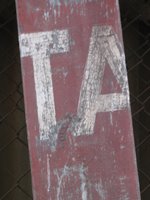
 The air was dark above Gravesend, and farther back still seemed condensed into a mournful gloom, brooding motionless over the biggest, and the greatest, town on earth.
The air was dark above Gravesend, and farther back still seemed condensed into a mournful gloom, brooding motionless over the biggest, and the greatest, town on earth.

A few weeks ago when I went dancing with E. in Bethnal Green, she commented with disappointment how all the grafitti in the toilets were myspace website addresses. 'What do they think, that I go there with my laptop? Where are all the sluts' phone numbers and the bad puns and rhymes gone?'
This world is becoming increasingly referential and flat.
* * *
Orage, thunderstorm, is one of my favourite words in French. Perhaps because unlike in English - or in Hebrew - it is a word of its own right, not just two words pasted together. Right now there's one raging outside. A late summer tempest.
Thursday, September 07, 2006
Insights from the holidays

1. Welsh crash course:
Lift = lifft
Fresh Coffee = goffi ffres
Good morning = Bore Dah
2."If you do not want your carrots looking like mutants, you must put very little muck (compost) in the ground."
3. "You can grasp nettle in your bare hand, and you will not get stung; the secret is, you must touch the leaves on their bottom side."
4. Jardin de Luxumeburg has an area reserved for reading. Excited talk by passers-by (even on academic matters such as early 20th century ethnography in Palestine) will solicit stren looks from the readers seated on metal chairs.
5. Paris in September is perhaps less beautiful than in November, but much easier, especially when walking down memory lane. The best companion for such solitary walks is, of course, Walter Benjamin's Passagen.
6. The smells of the Tube and the Metro are distinct and different; the first always reminding me of foggy rain, the second of chestnuts and pain-au-chocolat. No, I'm sure it's not my clicheed imagination.
7. The presence of millions of tons of water above one's head, while going through a dark tunnel at a bottom of a sea, is best kept at bay, by writing melancholic emails (outward journey) or sleeping (return).
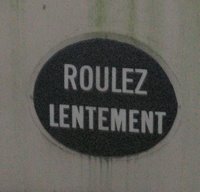
Monday, August 21, 2006
Obscure Visual Sign of the Week (36)
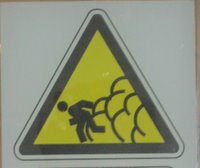
or
Freedom on the March
(pick your choice)
Besieged and beleagured, I have no choice but to evacuate, at least temporarily. I wanted to blog about my experiences life-modelling in a big financial company and my thoughts about watermelons, but these will have to wait for merrier occasions.

This blog is taking a short holiday. See you back in early September.
Thursday, August 17, 2006
Terrorist Mink
* * *
British Transport Police
Stop/Search Record of Person/Vehicle
Hair: short Hair Brown
Clothing:
Upper: Red shirt
Lower: Dark Jeans
Footwear: Brown Shose (sic)
Build: slim
Self defined ethnic classification: W9 (White Other)
The authority for the stop and search was
S.44(2)
Place first stopped (show a junction and approximate distance from):
British Library - 1st floor
The search took place on: 16/8/06 15:31
Object of Search: items connected with terrorism
Grounds for authority: SEC 44
Arrested? No
Officers stopping and searching 0098
* * *
'You match the description of someone against whom severe allegations have been made.' I've been through this before, in a random search for drugs outside Crofton Park Rail. A dog smelled weed my housemates smoked the previous night; the police officers were more apologetic at the time.
Being body-searched by police officers in uniform, in the middle of the library, in front of everyone passing by, is of course humiliating. I tried to see the amusing aspect about it (just when you're feeling the most down, what can cheer you up more than a copper feeling you up - didn't expect this when you went for a short watercooler break ha!). I also know well that this is just a taste of what some people here get all the time, if you look Muslim or middle eastern, I'm not even talking about Arabs/Arab looking Jews in Israel. For me, it's important to know how it feels.
It became less amusing when they said they would take me downstairs to 'chat' with the officer in charge, and that they would have to search my locker and clear my things from the reading room. I started thinking this could go all day, or even... well at least they didn't shoot me in the head 8 times on the spot.
I was happy when they decided to leave me alone.
From now on I'm staying inside Rare Books and Music.
Friday, August 11, 2006
British Library HiKus
screaming thoughts of dinner:
Pita bread and Solitude.
* * *
Oh PhD, eternal cycle
of packed lunches, no release:
Dahl, pasta, Dahl.
* * *
Afternoon eye contact in Humanaties
adds much interest to a medieval
endowment inscription.
Monday, August 07, 2006
Peak Oil
It's from the Oil Drum, which looks like a good, informed site. They put Peak Oil at 2005+-4.5. That's bad news. Get your vegetables patch ready."We all see the petroleum economy as the fundamental linchpin of our present democratic society. As cheap oil/energy/gas quietly fades into history, lives around the world will indeed change.
"This real and tangible crisis of supply and demand is now inevitable. Whether the coming crisis arrives in six months or in four years, whether the crisis arrives in a slow, secular fashion or as a cataclysmic "shock," our purpose is the same: we are here to raise awareness of the reality of the current problem and to attempt to address the real issues that are often hidden by political pandering."
Unrelated, for those who missed the Guardian's excellent report about soy, read it here. Not for vegans only: as they make clear, whether you know it or not, you're probably eating soy in some sort every day. Bad for you, bad for your fellow humans, bad for the planet.
Towers of London
They were talking about cities in the Amazon: Belem and Manuas, former centres of unimaginable wealth, acquired through the rubber trade. European mansions and opera houses in the Amazon basin: it was quicker to get on the boat to England than to cross the mountains to Lima. A late Colonial folly, ending suddenly as it begun, when the British stole the trees and took the operation to Malasya. And now all that remains is lost splendour in the jungle. Herzog filmed Aguirre, the Wrath of God there; I have to see it yet.
Night had fallen. A fair-haired woman was teaching her child to call the star by name, in Finnish: Tahti, she pointed up, Tahti
Ta-ti said the girl.
Tah-ti, said the woman.
Wednesday, August 02, 2006
Monday, July 31, 2006
The Market Diaries: Sunday

Six days shall the market work, and on the seventh day it shall not rest. Six days of the week the Wholesale Market is London's terminal for fruits and vegetables; produce is delivered, produce dispatched. From South Africa and Thailand, Colombia and Peru, all roads lead to the Market, which every day sucks, devours, spouts and belches tons of food. But on the day of the Lord, the belly of the beast is full, the skips are set aside, and the wide concrete avenues of the Market are overcrowded with shoppers. The beeping sounds of reversing forklifts make way to the happy shouts of children and mothers. It's the Sunday Market.
In four years in London, I have never seen this market mentioned anywhere, in the press or in the media. There is no sign leading to it. The only textual reference is ambiguous and negative: 'No Parking for the Sunday Market' says a banner in the nearby Sainsbury (those who choose to defy the sign carefully wrap their shopping in black plastic bags before they sneak back into the parking lot). As far as I know, it's advertised only by word of mouth. In the heart of London, this invisibility is striking. Walk five minutes to the river and you'll find the London (TM) skyline, London from TV and movies. But the bleak setting of the Wholesale Market and the cheap merchandise on sale leaves very little room for doubt, this is no tourist attraction, no Portobello or Brick Lane, and it cannot be made into one.
What's on sale? Cheap clothing, electric appliances, belts and luggage, shoes, cleaning products, home improvement bits, bike-accessories, children toys, bric-a-brac, fake cds and dvds, and plastic in every shape and form. No handicraft or fair-trade items: the brutal flawless logic of the Wholesale market is alive on Sunday as on any day of the week. Imported goods, whether tomatoes or jeans, belong to the same story: overseas sweat-labour, mass production, cheap costs, and little value.
If you ever wondered how poor people survive in this super-expensive town, how can anyone possibly live here on a cleaner's wage (let alone support a family, and send money to Poland or Nigeria) the Sunday Market provides some answers. It is one of these hidden networks and institutions that make life here possible, that make the difference between having little money and being poor. It's far from grim. The Sunday market is a family affair. The crowd seems mainly African and East European, but also Turkish, Columbian, Chinese, and every nation and language you can think of, all the children of Babylondon: blessed are the poor, for they shall inherit the plastic of the earth. They roam, they browse, they bargain, they buy, they eat hot corn and jerk chicken. It's a fun day out.
By four pm the Market is almost over. Cycle through, you might get lucky and find random plastic moments abandoned by a despaired vendor. The crowds happily disperse, leaving behind mountains of rubbish, cardboard, coat hangers and wrappings. But no worry, after all, waste is what the wholesale market is all about. In a couple of hours, all will be devoured, and the large avenues will be empty and clean, shining of concrete desolation, ready for another week.
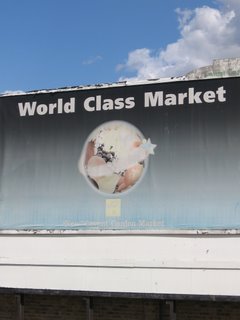
Saturday, July 29, 2006
Goodbye Electric Lane
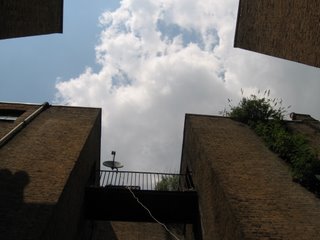
Six weeks ago I left Brixton. It wasn't an eviction: Clifton Mansions is still going, and will probably last the summer. For the first time I chose to leave of my own accord. A tedious, convoluted story: contradictory promises were made by the former resident. There was a dispute who has the 'right' to No. 19, and for how long. The ambiguous, unwritten rules of squatters' ettiquete were invoked and challenged. For me all this didn't matter much: I don't believe in rights. I was living in no. 19, and I could have stayed. But I chose to give it up.
Through all my squatting years, Clifton Mansions stood as a distant haven. During three years I moved house 9 or 10 times. Eviction, disruption, excitement, despair: all this time I knew that the fortunate Clifton residents were safe from the cycle. The Mansions were stable: the court case dragged for years. Of the problems I knew well: the flats were freezing cold in winter and too hot in summer. Lack of light. The buildings were badly built and badly maintained. The hassle of the drug dealers in the yard; the noise. All these seemed a price worth paying. I thought of it as Camellot, a safe castle standing wrapped in misty winds.
Three months of living there had driven the mists away; things stood clearer. Strangely, the romantic image remains, alongside the real experience. These are fragments of a belated farewll.
* * *
When I grew up there were hardly any black people in Israel ; Ethiopean Jews came first in the 1980s, and were still much of a curiosity (now there's more of them). Living in an area where about half the people are black was therefore a new experience. It is one thing to think of yourself as free from racism; it is quite another thing to put it to a daily test. Racism lives in our heads, whether we want it or not: it's too deep in our culture(s) to pretend that it can driven away simply by ideals. When I first lived in Brixton - three years ago - I found my own racism, in the way I looked at people, in my body reactions. Partly it was the fear of the Other, the one who looks different; and partly it was things I heard and read in books and films, that have become part of my unconcious. Brixton gave me a chance to confront these notions in my head, and to rid myself of them as part of a daily experience.
Yet 'a black neighbourhood' is a misleading generalization. There is a big difference between the African community and the West-Indian. The Jamaican community is the domminant in Brixton, culturally and economically. I like the way rastafarians are so outrageously loud and direct. I like the way everybody waves to eachother on the street. There is a sense of a living place, that I rarely find in other parts of London. But there were also things I didn't expect, like aggressive male-chauvinism and homophobic attitudes. I know too little to make generalizations. But the incidents which I witnessed surprised me - not only because the men involved were abusive - but also the sense of rightousness that they had. There was something almost religious about it.
* * *
'I'm sick of Brixton, all the drug-dealers...' yes there is a lot of drug-dealing happening, and it's often a shorthand for all things nasty and unpleasant. But why are drug dealers worse than other dealers? I think more should be said.
If you are walking down Brixton Road and Coldharbour Lane in the evening you will be offered skunk every two meters. Now I don't like skunk and more so I don't like to be offered stuff to buy when I walk down my street. I don't care much if it's giant billboards selling shampoo or people pushing drugs shouting in my face: it's the same thing, unsolicited attempts to catch my attention in order to make profit. I think black people don't get hassled the same way. But as a white person walking down Coldharbour Lane I was assumed to be someone on a night out, a customer. I resented it. I was just walking home.
Crack is a serparate mileu, traders and clients. There was a crack dealer living in the courtyard. He was high on it half the time himself, just sleeping on the couch in the middle of the day, dumb and numb. Other times he would sweep the courtyard and burn incense sticks. He was harmless. His customers were erratic miserable junkies, who I didn't know and didn't care to know. I could hear them in the yard at night, pissing and swearing and arguing. Their lifestory is probably sad and horrible but I wanted to keep out of it. It is not pleasant to go out of your door and see someone smoking crack hidden behind the bins. The smell is foul.
I never felt at serious risk. The problem wasn't fear, but the notion that you have to be constantly careful and aware of the people around you. That you have to brace yourself before leaving home, before stepping out to the street. That step of relief when locking the gate behind you. It gets tiring very soon.
* * *
One of the signs of gentrification is trendy places opening up, bars and cafes, organic food shops. Not all of these are yuppie and soul-less. I can be sarcastic about these things but I like good food and it's nice to have a variety other than workers-cafes offering full-english-breakfast. Of these places I liked best the Ritzy. Drinking Jappanese beer overlooking townhall square, Brixton feels cool and viberant and diverse. But when you step back into Coldharbour Lane you till bump into crackheads and crazy people muttering FUCK FUCK FUCK. Brixton's gentrification seems less uneven than the usual: a lot of kicking and screaming involved.
But the more disturbing side, for me, is the club scene, Brixton's status as a cool place to go out. It thrives on the dodgy reputation of the area. This 'edgy' character brings in money, people from richer parts of town looking for a dose of excitment on the weekend. While in King Cross e.g. the dangerous image (drugs and prostitution) is a 'problem' to be 'solved' through regeneration, in Brixton it's too much part of the story to tackle. There is a feeling of sponsored edginess - that too much money is being made - that I find disgusting.
* * *
My favourite part of Brixton was and remains the Market. Fruits and Veg I get from elsewhere, so I would go there for other things: Syrian pickles in the Persian shop, Turkish bread in the Portugese one. But I loved the noise, I love the old ladies with their baskets and trolleys. And I love going there at night, cycling through electric Lane, when all is dark and quiet, dodging the holes in the road and thd dirty water puddles. In my head I can hear the noise of the daily market that died only a few hours ago (the Carribbean music, the cheesy Indian pop tunes) and this makes the silence tactile, like a pause in a conversation. Alive, only sleeping.
Tuesday, July 25, 2006
 It's not been this hot since the summer of the Iraq war. Then - three years ago - the summer broke out early, gloriously, as they say here (I grimace), shining down while we watched and followed, with fear, concern and sometimes hope. It was the spring of Vauxhall Grove, and I had found my first room, after four years as a living couple: that room was tentative, and only temporary (is it ever different), and very little in it was mine, except my dream-notebook under the pillow. I watched long evenings burning ships dance on the wall, the shadows of candle-lit-existance. Then we gave up current affairs, and cycled on, cycled through, to arrive a month later tanned and troubled to a year in the East End. Summer 2003 was all Pink Jesus.
It's not been this hot since the summer of the Iraq war. Then - three years ago - the summer broke out early, gloriously, as they say here (I grimace), shining down while we watched and followed, with fear, concern and sometimes hope. It was the spring of Vauxhall Grove, and I had found my first room, after four years as a living couple: that room was tentative, and only temporary (is it ever different), and very little in it was mine, except my dream-notebook under the pillow. I watched long evenings burning ships dance on the wall, the shadows of candle-lit-existance. Then we gave up current affairs, and cycled on, cycled through, to arrive a month later tanned and troubled to a year in the East End. Summer 2003 was all Pink Jesus.This summer is even hotter, I conclude, walking up Walworth Road with a Namibian beer bottle (it's weak, and nice, and I think of Michael), dusk descending on the Elephant beyond. I've gone to two cold showers a day; escaping to have ginger beer in the Ritzy; but mainly hiding in the BL. Right now, in 'Asian and African Collections' (the renamed 'Oriental and India Office'; Political correctness, or perhaps Imperial amnesia). Persian kings - Nadir Shah espcially - are looking over my shoulders, their portraits huge and meancing. It sounds like the fire alarm now. I think escape is advisable.
Thursday, July 20, 2006
The Market in Summer
Only a third of the vegetables? well I guess a large portion of the rest is potatoes.
Anyway, good point. Fruit and veg. Fridge empty. It's market day.
Skipping in the summer is a bit frustrating. The skips are full with fruit and veg, but most of it is no good. London is so hot these days, with tempratures well above thirty. Prodcue spoils quicker in this heat, on the way to the market and while it is stored there. It can go bad in a few hours of standing in the sun. The smells are stronger, everything a bit muckier. The sight and smell of rotting produce: not for beginners. But there is still lots to find, especially if you come early. And somehow it seems that the security are not bothered. Maybe it's too hot for them to get out of their air-conditioned office
There was lots to find. It was vegetable day, aubergine galore and organic squashes and courgettes. Hardly any fruits. Exactly the opposite of last week. But the market works in mysterious ways.
Monday, July 17, 2006
Michael on Radio 4
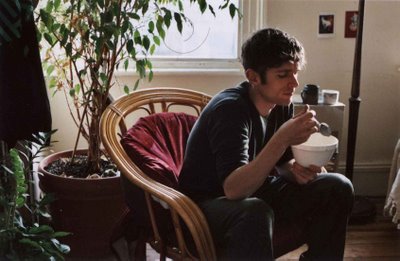
Michael, Mr. best and most-missed housemate of all times, will be on Radio 4 tonight speaking of his bicycle project in Namibia, south-west Africa. The organization he set up gets discarded bikes from Europe, fixes them up and distributes them to NGOs in Namibia, mainly to HIV-patients outreach workers. The aim is 'empowering disadvantaged Namibians through access to affordable transport.' You can read more on the BEN-Namibia website.
The program will be broadcast on Radio 4 9pm UK time, and it will be available on the 'listen again' section on the website.
UPDATE
I corrected the link to radio 4, and it now points to the program. If you have broadband access, do yourself a favour and listen it. It will make you a bit more optimistic about the world. Michael's project is simply remarkable. His 'get up and do it' attitude inspired me many times when we were living together. And what he's doing in Namibia is just amazing.
Thursday, July 13, 2006
Taking Cold Showers
Like my previous place in Brixton, my new home does not have hot water. Unlike Flat 19, it has a shower. After trying to find some alternative solutions I decided it's a good opportunity to overcome my dislike for cold showers.
In my last year in highschool we had military officers from various units come and explain to us why we should join their ranks. One of them came from the Marine Commando. What I remember most from his talk was that part of daily routine was a swim in the sea at 6 in the morning, rain or shine, winter and summer. The idea of waking up to be thrown into freezing sea water was for me far more offputing than the risk of diving into enemy ports or attaching bombs to submarines.
But when I take cold showers now, I prefer to think of a different role model: that of Khalil Sakakini, the Palestinian writer and educator, and one of my favourite Jerusalemites.
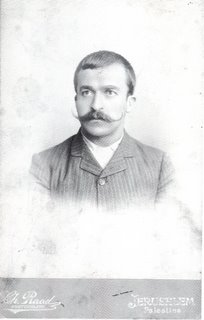
Sakakini had a regime which he developed in his twenties and kept throughout his life. He would wake up, exercise, and then wash thoroughly in cold water. Then he would smoke and write for an hour, have breakfast (of 6 eggs! the days before they invented cholesterol... he was vegeterian but clearly not a vegan). He called it his 'way of life', which helped him to overcome depressions and hard times, and in his diaries he often writes about it:
Tuesday, 18.3.1919: There are days when I despair from life and I see no purpose in my existence. But soon I pull myself from this despair, through my way of life. Without this way of life, which leaves no day void, my feelings would be poisoned, despair would seize me and boredom and wearniness would overcome me. But my way of life gives me new birth every day.
Sakakini took cold showers all through the year, even in the harsh cold of his prison cell in Damascus in the winter of 1918 (he was exiled and imprisoned by the Ottomans for giving shelter to a Jerusalemite Jew who was wanted by the authorities).
In some way, this regime reflects not only the modernity of Sakakini's ideas - he was an avid reader of European literature and phillosophy - but also of modern living conditions, i.e. homes with a bathroom and shower, and the availability of water; a generation earlier Jerusalemites bathed in public bathhouses (hamams), probably not more than once a week.
At the moment I am getting used to it, and the water seem less cold each time. But it's July: I don't think I'll be able to do it in February. It's London after all.
Tuesday, July 11, 2006
Friday, July 07, 2006
Gaza
The Market Diaries
The man, I learn as I read, is the chef-patron of La Noisette, a restaurant soon to be opened in Knightsbridge. Time Out tip him as 'the wild card' on the up-and-coming masterchefs scene, with a reputation for 'fabulously inventive dishes such as foie gras with espresso syrup and amaretto foam'. 'Son of a Dutch father and Spanish mother, born in Switzerland and grew up in New York, the UK and France, about to marry a Canadian - 33-year-old Bjorn van der Horst could have pretty well gone anywhere'. Funny, this exhilarating globalised mix of countries and nationalities sound exactly like what I find in the Wholesale Market bins. Yesterday, for example, I went there and salvaged Domincian Republic Organic bananas, Spanish lemons, Maroccoan oranges and Chilean grapes - all of these, as Time Out put it, could have pretty well gone anywhere, but like Mr. van der Horst, ended up in London.
Aren't we all so lucky.
The discarded pile of mandarines in the Market was chosen to create an impression: something playful and edgy, the mix of orange colour with industrial grit, something wild and urbane-sophisticated. The young chef must be pleased: in the age of celebrity-chefs, an exciting public image is as important as what you cook. But I wonder: what's so delightfully playful about wasted food? Imagine a similar picture in a slaughterhouse: the young chef (who promises lots of meat in his new place) patting the heads of crying lambs, or standing smiling above carcasses and blood. Even die-hard carnivors would not find this too playful. But when it comes to the slaughtering of the planet, it's all fun and games: mandarines going to waste, yupee!
Wednesday, July 05, 2006
Monday, July 03, 2006
Waterloo Omens
But three ominous developments have caused me to think of alternative routes.
1. The constant traffic-jam at the north end, caused by the roadworks, leaving no room for cylcists. About two thirds of the way I have to get off my bike and start walking amid irritated pedestrians.
2. The Charing Cross huge clock has been showing the time as midday for the last week. Its giant arms refuse to move. As any apprentice psychogeographer would tell you, this can only mean one thing: the end is nigh.
3. Most disturbing of all: the Waterloo Rabbit. I've never noticed it before, and it freaks me out.

Thursday, June 29, 2006
The man from BT had a soft scottish accent.
So, you're a home-mover, he said.
Yes, I confessed.
A serial one.
There is a common misconception of nomads that they roam the earth freely, with no fixed place to call home. But in fact nomads all over the world usually have very specific routes which they follow and locations that they stick to. These might alternate according to season and rainfall but the possibilities are limited and constrained by the social and natural elements.
Anyway, the nomad mink has recently quitted the grazing areas of Brixton, where we had spent the months of the spring. Gathering our herd and using the services of friendly tribesmen we have moved northwards towards the Elephant and Castle, where (cold) water is plentiful and the Turkish shop has nice Mediterranean cucumbers. A good location for summery slumbers, bus connections and the gathering of thoughts
Tuesday, June 20, 2006
Amman / London / Solstice
* * *
The first thing I noticed in London was how unlike in Jordan, images of the Royals are missing from the streets: no charming Queen in suit and hat, no serious Queen in Military uniform, no smiling Queen and Philip at home with the grandchildren; and certainly no Prince of Wales (thank god). Is the reason aesthetic? One has to admit that when it comes to photogenity, the Hashemites are far better endowed than the Windsors.
In Israel the culture of State worship does not entail huge street-posters of the current leaders, but rather smaller size (A3 I believe) full-colour posters of the current President, Prime minister and Army Chief of Staff. The main tabloids produce these posters and distribute them when one of the three is appointed, or maybe for the High Holidays? can't remember. In any case, people actually put them up, and in this sense it is not much different from the King's picture in shops in Amman, although not as prevalent. Most common at hairdressers, restaurants etc is the President's picture; the Prime-Minister's is more a matter of political taste, although people make allowences. The whole thing seems quite bizarre to me now, but when I first came to the UK, I was surprised not to find similar posters of Princess Di at Laundry places and Fish and Chip shops. After the emotional outburst that her death caused, I expected to find her picture around as a kind of tribute. When I asked people here about it they were genuinely appalled by the thought.
* * *
They said we were approaching landing at Heathrow, but surprisingly we were flying eastwards, towards the Isle of Dogs. The blinking of the Evil Towers could be seen faintly through the mist below us. The plane finally u-turned, revealing the swathes of South London. I tried in vain to make out the places which have been my home for the last four years: One Tree Hill, Brixton, Vauxhall. All I could see, however, were rows and rows of identical terrace houses, and railway lines cutting through them like scarrs. I realized that my ability to think of this place as home came only at the price of a long struggle with the landscape - whose basic features remain strange and foreign, even after almost five years.
The anxiety of the flight was behind me; that of the return to London was still ahead. The Thames was growing near. A last attempt to spot Kew Bridge failed. Crew get ready for landing.
Saturday, June 17, 2006
Ah, he said, but it's a guys (shabab) place.
I didn't quite understand. R took me there last year and it was very westernized cozy hangout. I
couldn't quite imagine it as a men-dominated middle eastern cafe . Maybe in the evenings? or maybe he had some other place in mind? it didn't make sense.
Is it not a good place for a woman? asked K from the back seat of the taxi.
No, there's no problem, he assured her. it's just a shabab place.
When we got there - I recognized the huge balcony with wall painted blue - I was about to leave the taxi, as he whispered to me, cheerfuly: hada gay place!
now it clicked.
and certainly the vibe was there, although it wasn't not exactly Soho, or the Vauxhall Tavern.
* * *
Where am I from? the taxi drivers ask me and I say London. But then I usually add (depends how comfortable I feel) - originally from alquds.
Israeli yaani?
Yes.
Most of them - actually all of them I think - are Palestinians, so I ask where exactly. Many Jerusalemites, some Nablusi. One Nablusi guy told me he can't go to visit anymore - since Sharon went to the Haram - but the family sends them olive oil from their grove.
Is it better from local Jordanian oil?
He looked at me reproachfully.
Are you joking? a thousand times better.
* * *
H is a friend of the friend I'm staying with. He gave me a lift back home; I found him soft spoken, pleasant to talk with, and extremely cynical. He's into real estate and construction here
, which is the right place to be: Amman property market is booming, construction work is everywhere. 'It's Iraqi money' he told me. 'They come here with suitcases full of banknotes'.
Where's the money from?
The war, he shrugged. They're stealing everything. You can see them here on the roads, always driving the most expensive cars.
And aren't you afraid that the troubles in Iraq will spill over to Jordan?
The more troubles our neighbours have, the better off we are, he said. Jordan is prospering on Iraqi money. Problems in Lebanon, Palestine? they'll all come here. I'm waiting to see how it works with Syria, or Iran. We'll make a profit. It's good for us. We're the only safe place in this region.
Perhaps he was being deliberately cynical, but as far as I could see he meant it. I didn't know how to react, and I was relieved to see that we had reached my host's house. There was something about him I liked, as much as I was appalled. He made no claim to be morally justified: he made it clear he was taking advantage of the world as it was. A line from Monkey Grip came to my mind: 'you're the emeny, mate, the ruling class. What are we going to do about it?'
It's stupid and simplistic, I know. But what do you do with people who have benefited enormously from globablization and its discontents - here, everywhere - and are unwilling to face the consquences for the much larger number of people whose lives have become much more difficult? Here in Jordan it is extremely visible: the gap between the poor and the rich is visible, but also the desperation of Palestine on one side, and the even worse devastation of Iraq on the other.
Visiblity is a key word. Living in the West, we do not see the consequences of our way of life, we do not see our slaves, our servants: the people on whose backs we are living. The agricultural labourers in Banana plantations, the hifi factory workers in Malaysia, the people making our clothes in Chinese sweatshops. What one doesn't see, doesn't exist. Perphas we are less ostentatious than the splurdging nouveaux-super-rich of "developing" countries. But can we claim to be morally different? The fact that I - personally - hardly paticipate in this economy, that I live on waste (my clothes found, my food skipped) - does not exempt me. I know well my current way of life is not much more than a fluc, a temporary arrangment.
* * *
Sorry. Didn't meant to be so serious and gloomy. It is a sunny day, and the air in Amman is amazingly fresh sweet. It's even better from the air in Jerusalem air.
I enjoyed the conference. Met some sisters and brothers-in-arms (or in-laptops). Exchanged emails and bibliographies. Practiced my rusty arabic - the drivers must find my accent strange. Since the last time I properly spoke Arabic was with Sinai Beduins, I keep saying Han and Hanak instead of Hon and Honak (for 'Here' and 'There). Heard good presentations which got my intellectual andernaline going (a good paper is better than drugs). Met my most admired social historian of Modern Palestine, Salim Tamari from Beir Zeit. Going home Sunday, to the Elephant and Castle.
Thursday, June 15, 2006
So what is your research about?
I am researching camel castration practices in Fatimid Egypt.
My study is on pre-Islamic Iraqi transvestites.
I'm looking at proverbs regarding belly-buttons in non-Muslim communities of the levant.
hmmm.
Today there was an interesting envrionemental panel on Egypt, on water problems and the reclamation of the desert. And it reminded me that the real issues are waiting behind the corner. Within twenty years - or forty, or ten - all the issues we discuss today will be largely irrelevant. The Israeli-Palestinian conflict will not interest anyone in a world without oil, without water and with a serious climate change.
But in the meantime, why not pass the time and have some fun. So what did you say your research is about?
Tuesday, June 13, 2006
Amman, Jordan
Yesterday, I boarded a bus that took us to the official opening of the conference. I sat in the last free space, next to a seemingly normal and boring looking elderly white man, who was dressed conservatively in blue trousers and shirt. When I looked at him again I saw that he was laughing continuously, a freaky silent laughter, without making any noise, while clutching his white hat feverishly. Then he started bending his fingers one by one very forcibly, apparently much to his delight. I felt like in a horror movie. I tried not to look again. Later I saw him waiting - very patiently - on the women queue for security check.
I always feel that there is something obscene about making a nice livelihood from the detached analysis of a region suffering so much bloodshed, poverty, oppression and misery. Living in a Western or Westernized enviornments, relatively free and safe from poverty and persucation, one can make clever comments on the state of the world. I include myself of course in this privelged class.
Today we were given a presentation on some new online database on the Israeli-Arab conflict. It was accompanied with a light buffet lunch. Unfortunately the organisers did not estimate properly the academic hunger. The scramble for sandwiches showed the wonderful subtle elbowing abilities necessary for the academic profession. I managed to get two: maybe I'll be good enough to get tenure one day.
Inside the overly airconditioned hall (with soft carpet-to-carpet) the organisers explained the benefits of the new database to the sound of munching. The database has thousands of documents on the Israeli-Arab conflict, and provides many delightful possibilities to learn more about a history of devastation; these were demonstrated through a search on the "King David Bombing" - a search which yielded 15 "hits". I thought I could hear them in my mind. And don't forget you can press all these hotlinks on the sidebar! though I thought maybe better not to press on anything.
Saturday, June 10, 2006
Flat 19
London, Brixton. 22.11.2001
Somebody outside is shouting Robert, Ro----bert, and it's sounds Israeli. The R is light, throatal, purposefull, and the emphasis so different from English, the stress is different. Not the French Ro-ber, nor the quick English Ro-bert. Tanya says she's French, she thinks, she's shouting for the key, can you throw it from the window, I forgot it somewhere. A window opens, a key is thrown, it doesnt' open, Danielle, can you hear me. Now it does; maybe Danielle went down to help her.
A London squat. Bars on the window, opens to a courtyard, and above a strip of sky, pale, soon it will darken. The courtyard itself is grey, and everything a little stifled, working-class melancholy. This is London; this is how I imagined it, this is how it is. The flat itself is full of charm, the poetics of abandoned houses, a bare brick wall, slashed and torn, its lower half painted red. Two small rooms, one opens to the other, a small kitchen, toilets, there's no shower and no fridge, but that's ok, it's cold enough here. There was no floor when she moved in, she and dave built the floor, padded a 40cm hole with stones, concrete, wooden boards and more boards, so today you enter on a collage of wood boards brown, sparkling varnished boards, and a few doors. This is her floor. In the living room, or the study, there is an architect working desk, and a mirror shaped like an elephant head, very abstract. Two big ears, one fat head.
It was left abandoned for a long time, before she moved in. Myabe nine years. Em opened it, sorted it a bit, but couldn't really be fucked, passed it over to Tanya on a tripped-out New Year's eve party. She went in, got very excited by it, worked on it a lot, but the winter is so dark in here and even in summer there's not direct sun light and it makes it sad. EM just passed through, sorting stuff out on the way to his trip in New Zealand. Red-painted dreadlocks and piercing, he scared me a bit, till I remembered my earrings look the same. He spoke of the Council evicting people, and how Section 6 is just bullshit, it doesn't protect you from anything. They're hiring private bailiffs, and if they come and you're not at home they drill the lock, confiscate your stuff, lock and seal the flat, he knows a guy that lost his Playstation like this, he had to break in through the balcony to get his stuff back. It's bullocks, because the Law protects you only if you're inside the house, if you're out than you're fucked baby. So why don't they evict everybody this way, wondered Tanya, EM didn't know. People think that once they're in for thirty days theyr'e protected, but it's actually thirty days after the landlords know you're inside, so it can be even after six years.
The people in the flat upstairs got evicted last week. At the end of a long legal process the Council won possession, so the squatters moved their stuff out the night before, waited until the Council changed the lock, and then moved back in again. Or maybe that's what they're planning to do, I didn't quite understand. A bizzare bureaucratic world, the Council rents out buildings, and then forgets about them, and suddently decides to get them back, wastes time and money in legal battles that last for years, instead of getting possession on whole buildings they fight it flat-by-flat, it doesn't make any sense, however you look at it. Why do they suddenly evict people, who do they suddenly give up or forget, the answers are hidden in the drawrs of the Council's archives.
* * *
A postcard on Tanya's wall:
People who talk about revolution and class struggle without referring explicitly to everyday life, without understanding what is subversive about love and what is positive in the refusal of constraints, such people have a corpse in their mouth. Raoul Vaneigem
Or perhaps they're unwrapping it, they're opening it to sunshine, uncovering the open window and the pot plant. There are open windows underneath. Cold and monotone ideology can be undone, the dead skin of the political discourse can be scrubbed.

Now, some seven evictions later and god knows how many house moves, I looked through that folder again. it had my favourite articles from the Historiography class. I flipped through one of them, Joan W. Scott's "The Evidence of Experience". I had marked some words such as 'agency', 'historicizing' and 'essentializing', and had written next to them: 'what is this, some kind of academic jargon?'
Now, hours before another house move, I found the courage to threw them away. I kept only one, another classic Scott article, 'Gender: a useful category of Historical Analysis'. All the rest have to go. It's never too late to give freedom to your beloved possessions.
Thursday, June 08, 2006
urban nomad goes to work
Cycle fast, cycle quick. Use the wide handlebars to circumvent any trouble, lightning manouvres around open drains in the road. So quick that when you pass the Stockwell round about, forget to look at the clock, forget to look back at the graffiti: At the going down of the sun and in the morning / We will remember / THEM
Next thing you're cycling through Guy and St. Thomas's back gate, in the distance that soothing view of the trees on the other side of the river, green and full of morning light. The shade of the hospital buildings, the tide somewhere in between. Shell building towers aove, but no one to wave to. Waterloo bridge, 9:17. You might just make it. Last exams day. Don't want to be late. Someone calls your name. You think. You charge ahead at the road works. The long busses try to kill you. Don't let them. It's a hill all the way to Bloomsbury, although it doesn't look like one. Thirty minutes from home to the College Basement room. On the bus yesterday it took you a full hour. 9:30. Three exams, 47 students.
Implement QUEST5 for the input m=2 and n=11.
Why does Kant say nothing about the problem of other minds?
Can we justify induction?
You may begin, you have three hours. Read Foucault on hetrotopias:
Sunday, June 04, 2006
Obscure Visual Sign of the Week (30)

Friday, June 02, 2006
To think that they provide Her Majesty's spymasters' refreshments is really depressing. Just imagine James Bond sitting there munching on low-quality bread, boring cheddar and unhealthy mayonais, all from the plastic package over his computer screen. It might explain the sorry state of things here.
Thursday, June 01, 2006
Losing it
And no one brought anything...
"I was here last night and this morning from 6.30am. Nothing".
Looked through the rubbish bin in the PG room, on the window sill in the toilets, under the desk where I supervised an exam yesterday. Nothing.
Myabe I should write an obituary. Like I did for my bike. Only I still stupidly hope to find it. And it feels strange to mourn a sim card.
Walking to the South-Indian takeaway place, I read the white-chalk writing on the brick wall:
I USED TO BE INVISIBLE
Wednesday, May 31, 2006
"Did you still use the toothbrush afterwards?" I asked.
Very carefully, said E.
Then he had to take the water out of the pond and scrub the paint sediments off the bottom. Another two frogs died overnight but two survived. He had to bury the dead ones in a special frog cemetery at the garden.
But now there's a new generation of tadpoles.
"Did you say anything?"
I told him he was an idiot, Pete said with a serious face, but then laughed: I don't think it will happen again.
* * *
We were drinking the red-wine-bladder pinched from Kali's Degree show. Pete said he could write a novel if he was living in no. 19. I told him I thought so too before I moved to this flat, but it's like a prison cell, I'm not enjoying it and I can't work there. It's a hovel, a dive, said S. We were talking about recent Clifton troubles, (for another post) there's a lot of aggression, homophobic shit, threats of violence. "And yesterday" said S. "somebody graffitied all around the front doors a long inscription about how he was righteous and in the image of Jehovah and how all the artists in Clifton Mansions are EVIL".
Monday, May 29, 2006
The Market Diaries: Oxheart Saturday
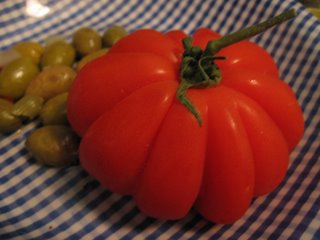
Oxheart tomatoes, of which I skipped a whole bag on Saturday, are different. They are uniquely unpleasing aesthatically, in way that is truly exotic, and hence can actually enhance their value as a quaint, boutique vegetable, "old-fashioned favourite" for connoisseurs. It's the Lyle Lovett appeal: you're so ugly it's attractive.
The oxheart tomatoes I skipped were not thrown away because they were too ugly, they were just ripe. Good to eat but too late to sell, like most of the produce that ends up in the skips of the market. I didn't find much else: lettuce, parsley, lemons, leeks, apples and pairs. Saturday is a slow day, but it's the only day I can go during the exams period.
Sunday, May 28, 2006
Wednesday, May 24, 2006
Iraq/UK
Why do these words ring hollow? Why is it something that everybody here know, but won't do anything about? Not enough UK casulties? Not enough suicide bombings and beheading vidoes? Or too many? What are people waiting for? Or maybe it's just not important as, say - the housing prices.
Perhaps human solidarity is not a good enough basis for political action, but how about self-interest. If anyone imagines that the mayhem in Iraq can be kept at a safe distance then they are wrong, wrong, wrong. The levees that are supposed to keep the West safe and dry from the flooding currents of hatred and dispair have been crumbling in the past fifteen years. Borders will not keep anyone safe, as long as globalisation continues to erode them. I'll stop here before I get more into doom and gloom. For more Iraqi blogs see Iraq blog count.








